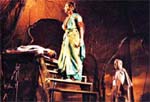Ataur Rahman
 Rabindranath Tagore, the greatest Bangali poet and litterateur, traversed all domains of literature with amazing success. As a performing artist, he left a commendable impression in play-acting and direction. As a singer he was unparalleled in his prime. He earned fame as a painter of universal stature, although his branch of fine art was a very private affair.
Rabindranath Tagore, the greatest Bangali poet and litterateur, traversed all domains of literature with amazing success. As a performing artist, he left a commendable impression in play-acting and direction. As a singer he was unparalleled in his prime. He earned fame as a painter of universal stature, although his branch of fine art was a very private affair.
Rabindranth Tagore was a playwright of unique genres. He wrote about 60 plays, which include serious dramatic plays, dance and musical plays, verse plays and comedies. In his plays, Tagore was more cosmos–bound, and a political being but not in a cut and dry materialistic way. Tagore was lyrical and wrote dialogues with deep sub-text, at times drawing from the legacy of the past as epic-reality, but not devoid of relevance with the present.
He depicted core human values and commitments in his plays, which are recognized as a unique genre in the playwright’s own right. Take for example, a dialogue of the king of Gold Mine from the play ‘Raktokarobi’ (Red Oleanders), wherein Tagore is making us aware how titanic and tyrannical power crushes itself under its own weight – ‘Nandin, one day in a distant country I saw a weary mountain just like myself. From the outside I just couldn’t make out that all its rock pined inwardly. Late one night I heard a horrifying noise, as if some demons’ long-suppressed nightmare had suddenly broken. In the morning I saw that the mountain had sunk underground from the force of an earthquake. I understood from seeing that mountain how the burden of power crushes itself, unknown to itself’ (translated by Ananda Lal). It reminds us of the innumerable tyrant-dictators of the world who were ultimately crushed under the burden of their own power.
In his famous abstract play ‘King of the Dark chamber’ Tagore is reminding the pompous men that the dark colour is the permanent colour of life, which is perhaps the colour of death. In ‘Dakghar’ (The Post Office), Tagore was at his best in depicting the ever-present beauty of this world, for which we are all waiting in order to attain salvation. In ‘Tasher Desh’, Tagore has allegorically condemned a regimented society administered by a group of people, through dance and music, alongside hilarious but meaningful dialogue. Thus, his plays were all written against social evils-‘Achalayatan’ against religious bigotry, ‘Bisharjan’ against mad and meaningless killing, ‘Muktodhara’ against tyrannical power that deprives common people, ‘Sati’ and ‘Malini’ against superstition and fundamentalism, ‘Rother Rashi’ in favour of human rights, ‘Chitrangoda’ against the artificial masked face of society and ‘Chandalika’ in favour of human equality irrespective of cast, colour and creed. These are only few examples.
On the occasion of Rabindranath Tagore’s 150th birth anniversary our audience has the opportunity of watching a handful of Tagore plays, produced in different forms and thematic interpretations. I, as a theatre practitioner, will only wish that staging of Tagore’s plays should not only be occasional. We should regularly take a dip in Tagore’s ocean of plays, the way the stages of the world are showered with Shakespeare’s dramas.
In Tagore’s serious plays like ‘Achalayatan’, ‘Bisharjan’, ‘Muktodhara’, ‘Raktokorobi’, among others, we have meaningful rendezvous with the protagonists, who are the saviours through death. In his article titled, ‘Red Oleander: Author’s Interpretation’, Rabindranath Tagore, in his own English, expressed his deep feeling about the play ‘Raktokorobi- ‘The joy of this faith has inspired me to pour all my heart into painting against the background of black shadows- the nightmare of a devil’s temptation-the portrait of Nandini as the bearer of the massage of reality, the saviour through death’. Almost all the major plays of Tagore have hoisted the flattering flag of fearlessness against all odds, and finally, death.
We have endeavoured our best to pay our tribute to Rabindranath Tagore, on the occasion of his 150th birth anniversary, by staging a number of his plays. I am quite sure that the theatre groups of our country will joyfully put up numerous more of his plays in future. Let that be our commitment on the occasion of 151st birth anniversary of this multi-faceted man named Rabindranath Tagore.
(The writer is an actor-director-writer)
Article originally published on New Age




















